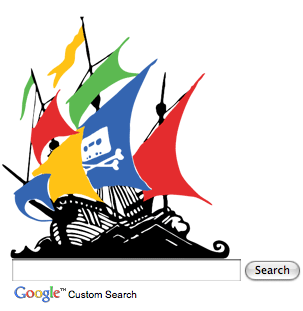
It should come as no surprise that many of the artists and new media practitioners regularly featured on this site rely on illegal file sharing for the content and tools used to make their work. Last week the four operators of the major torrent tracking site, The Pirate Bay, were brought up on criminal charges by the IFPI (International Federation of the Phonographic Industry), representing a group of intellectual copyright holders, and were sentenced by the Swedish court to a year in prison and a $3.5 million fine after a much publicized trial. In the wake of these trials, a mysterious cyber activist and defender of internet neutrality launched The Pirate Google, a website that limits Google searches to the previously indexed torrent files. It's an act that throws more smoke in the face of the politically and economically biased charges, as Google's indexing system has long allowed access to knowingly copyrighted material, while Google-owned YouTube hosts it directly.
In an email, the creator of the site told us that while Google has attempted to block inbound searches from The Pirate Google, he or she did not feel it would be possible for the IFPI or the corporate giant to take legal action, as they don't advertise and don't profit from the site. Its purpose is simply to raise issues of complicity and complexity in hosting and defining illegal materials. In this sense, the site is as much collaborative art piece as technological utility, as it seeks to undermine the advancement of institutional leaders, be it established museum, gallery, or artist, in favor of the disenfranchised. And who doesn’t love a good Damn The Man collaboration now and then? Masked defender, we salute you.


This could have been a thoughtful article on the conceptual implications of the Pirate Google website but the first line destroys the whole thing. Flaunting the assumption that the new media community "relies" on breaking the law is both irresponsible and childish. Ally, just because you think it's OK doesn't mean that the rest of us do. I find appalling this slightly veiled suggestion that we as artists have some sort of right to download illegal material, especially given all of the discussions that have appeared on the now lame, broken ("He's dead, Jim.") mailing list regarding remuneration for our efforts as artists. That opening line makes me think that you're missing the point entirely. It's not about illegal file sharing being OK but rather about who it is exactly that is breaking the law.
No one needs to "rely" on illegally acquired software. There are plenty of open source alternatives that provide the same functionality as proprietary software. I sincerely wish that Rhizome would stop disappointing me so consistently.
Pall Thayer
Lol - I love the concept, but I doubt it will last very long…
Yeah, I give it 6 months.